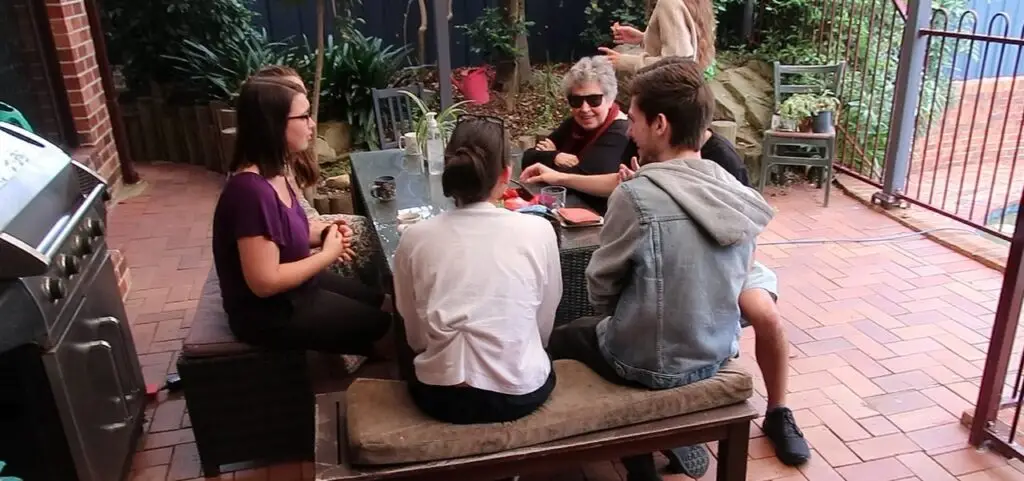We live longer these days (on average).
Threescore years and ten is now just the beginning of old age. If you live in a first world country and get to 70, you can expect (on average) to live to about 85, with women getting an extra year or two more than men.
What does a Christian do with those remaining years?
I’ve been thinking lately
A strange thing is happening. All my friends are getting older. Churches seem to be full of old people.
Sometimes I have to remember that I’m getting older too.
But sometimes I wonder. What could these older Christians be doing for the kingdon of God?
There are several ways I believe older Christians can be bolder Christians and of great service to God’s kingdom.
1. Older mentors needed
There’s lots of evidence that young adults and teens benefit from having an older adult mentor them. They are less likely to develop drug and alcohol problems or experience depression, and more likely to become a leader or volunteer.
For Christian young people, the advantages are even greater, as older Christians share wisdom and experience in faith and life.
As an added bonus, older mentors gain from their interaction with younger people via improved brain and cognitive function, better health, happiness and wellbeing.
Personal experience
I have had the privilege of being a mentor to many young adults – in both friendship and informal relationships and in slightly more formal mentoring programs. We have led a home group/house church for young adults for 9 years, seeing them grow from students in their late teens to professional adults, partners and parents.
We’ve been invited to 21st birthday and engagement parties and wedding celebrations. We’ve had informal meet ups for coffee, breakfast or lunch, or just a walk in the park. We don’t generally initiate these, they do.
I continue to be slightly amazed, but gratified, at the blessing it is for us, and presumably for them as well.
I have summarised some of what I have learnt from all this in Making young disciples in the 2020s.
Start (and keep going) with friendship
Formal and organised mentoring programs have their place. But I believe the best old-young relationships start and continue with friendship.
It can be daunting at first for an older Christian to build a friendship with someone half or a third their age, but it can be done.
- Take a genuine interest. Small thoughtful actions like complimenting young people who participate in the service or some other activity can let them know you are interested. I remember building a relationship almost by accident by asking a teen who played guitar in the church band to show me the guitar effects he used. I was genuinely interested, and he was happy to show this old dude his gear. Ten years later, we’re still friends.
- Take part in activities that allow you to mix with younger people. If they run an activity like a trivia night to raise money, try to be there. Can you serve the youth group in some way? We were asked to serve in the kitchen for a large youth group that supplied dinner. We did it for 13 years, and made so many friends.
- Try to get to know them. When you have an opportunity, ask the younger person a question or two about something that won’t leave them thinking you’re checking on them in some way.
- Don’t force things. Let them take the initiative in asking deeper questions, or not.
- Be wary of passing judgments or giving advice. Young Christians need to learn to depend on prayer and the Holy Spirit for guidance. Pointing out spiritual principles is good, but telling them what we think they should do could easily stifle the Spirit and their dependence on him and, could stifle our relationship. And of course, our advice may not be right anyway.
- Don’t be shocked and don’t react to things we are unfamiliar or uncomfortable with. Rather, ask more questions.
- Pray for them, and when appropriate, tell them you are praying for them.
If we older Christians take things gradually and softly, we can be a great blessing to younger Christians.
2. There’s so much more
Of course not everyone is gifted in mentoring, and some people’s health and age prevent them from participating in many things. But there are so many other ministries that older Christians could be involved in.
- Keep in contact with friends, especially young people, who’ve moved away. An occasional letter, text or email offering encouragement and enquiring about how they’re going can be a blessing.
- In small towns, in Australia at least, churches can often struggle and youth can be at a loose end. There is surely a role for older Christians in small towns to be an unobtrusive “chaplain” to the town. (Watch for a full post on this in the future.)
- Keep aware of what is going on politically and socially. Older people can still write letters to their representatives, write letters for Amnesty, support First Nations initiatives and stay informed about major issues like climate change.
- Are there places in the wider community where you can volunteer? As we get older we may not have the same energy levels, but often there are tasks we can take on.
- Prayer is something everyone can do.
3. Embracing change
If we look back through church history, Christianity has been in a constant state of flux. There have been major changes like recognition by the Roman Empire, the great East-West schism in 1054, the Protestant Reformation, the Pentecostal revival and Charismatic renewal.
But smaller changes are with us all the time: new churches starting and old congregations ceasing, new songs and new styles of music, different language and idioms, new emphases on the Holy Spirit, or social justice or spiritual formation. Some of these will be in response to changes in the culture around us as we seek to minister to people in the most appropriate way (as Paul says in 1 Corinthians 9:22), and all will (or should) be led by the Holy Spirit.
Older people can develop resistance to change, want things to stay the same. The world around them is changing all the time (think of the new technology in an older person’s lifetime), and they learn to adapt, but it can be nice not to have change in the church.
But such attitudes are likely to hold the church back from following where the Spirit may lead. While the church does exist to provide comfort and continuity, this isn’t its main purpose. Our mission from Jesus (making disciples) must have priority.
It would be wonderful if older people could recognise this, and embrace change. Some do, but some don’t.
Being willing to embrace change is also necessary if mentoring younger Christians. They live in a different world, and if we aren’t willing to accept that and learn to understand and think in new ways, we may find it difficult to build friendships.
Issues that older Christians never faced may be important for younger Christians. I’m thinking of things like gender (either their own gender identity or their friends’), online bullying, questioning doctrines or the very existence of God, church trauma, etc. (Such things may have been present, but few of us knew about them.)
Informing ourselves about such issues, especially by being willing to listen without judgment, and being willing to grapple with them honestly ourselves, can be a great help to young people who trust us enough to talk with us about them.
4. It won’t just happen
Most of us know churches, maybe are in churches, where change is inhibited by older people. When that situation occurs, it may be possible to win them over to accept new ways. I know of one minister who built such a caring relationship with the older congregational members that they trusted him and allowed him to make changes.
But overall, it is better to prepare people for change, and for ministry into old age (including mentoring younger Christians), long before they get old.
- Build a sense of all-age community so everyone knows and cares about people outside their age group..
- Set up processes to help people see the big missional picture and want to be part of it.
- Encourage and equip adult Christians to be able and keen to mentor. (I know of a pastor who found very few adults felt able to mentor, despite them having been Christians for decades and raising their own family. We can do better in our teaching and training!)
- Keep doing new things and explaining why they are being done. As well as making people more comfortable with change, it will be fun and creative.
- Specifically prepare adults for ministry in older age, by explaining the purpose, equipping and encouraging them, and then supporting them.
- Have people from all ages giving in the services reports or testimonies on their ministries, as living examples, and have older Christians be part of this.
- Keep the vision alive by constant reference, teaching and reports, so it becomes one of the features of the congregation.
Older & bolder
Let’s encourage our older Christians to not just settle back in retirement, but to have the deep joy of continuing to serve as long as they are able.
Like the epitaph of the Swiss mountain guide: “Died climbing”.
Photo by Andrea Piacquadio.
Read more

Making young disciples in the 2020s
Ideas on passing on faith to the next generation, based on many years of experience.

Young adults who walk away from Jesus
Sadly, many young adults walk away from the faith they committed to as teens. What can we do about this?

Urban tribes and the church
How might the christian faith be meaningful to urban professionals, and how might the church need to adapt if it wants to be alive in the next generation?

Leave a Reply